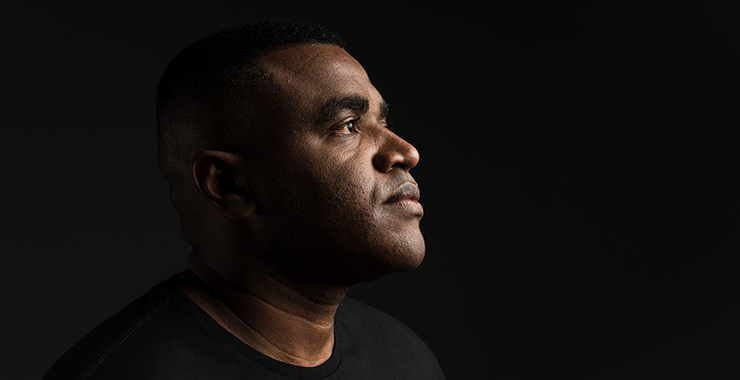Black Women That Can't Get Along With Anyone
Continuing education
Black men's mental health matters
Psychologists are working to develop more effective ways of promoting Black men's mental health
Date created: September 1, 2021 16 min read
Vol. 52 No. 6
Print version: page 40

CE credits: 1
Learning objectives: After reading this article, CE candidates will be able to:
- Describe how Black men's mental health is challenged by racism.
- Discuss the most critical intervention points for Black men's mental health.
- Describe successful treatment types for Black men, both traditional and innovative.
For more information on earning CE credit for this article, go to CE Corner.
Being a black man in America means being my brother's keeper. Being a black man in America means being my brother's keeper while keeping a distance from my brother because I don't trust him further than I can see him. It's believing the cops don't care about you. It's learning how not to doubt yourself because when you're born everyone else already does."
—Poet Prentice Powell, written following the fatal police shooting of Michael Brown in Ferguson, Missouri, in 2014
2020 was a year of reckoning about many things, but one central theme centered on police brutality toward Black men, sparked by the murder of George Floyd under a White officer's knee.
For psychologists who work with, study, and support Black men, that incident and the resulting protests were an added call to find better, more effective ways of promoting Black men's mental health, said Howard C. Stevenson, PhD, director of the Racial Empowerment Collaborative at the University of Pennsylvania and a national expert in helping people of color address and heal from racism.
"We should place less emphasis on whether Black men are resistant to therapy," said Stevenson, "and more on understanding the contexts in which they already feel comfortable talking about their feelings and traumas. If a Black man is able to find a treatment that is culturally responsive, that he understands, and that embraces the uniqueness of his difference, he is more likely to use that service."
There is a long way to go toward making such mental health care universal, Stevenson and others say, but psychologists are crafting several promising interventions that address issues that Black men face. Besides adaptations of individual therapy, these include community programs in barbershops and other local venues, outreach through technology and social media, and national networks devoted to facilitating Black men's mental health and well-being.
The more that systems, programs, and providers find culturally relevant ways to foster Black men's mental health—including directly addressing racial trauma and its effects—the more society will benefit, added Wizdom Powell, PhD, an associate professor of psychiatry at the University of Connecticut and director of the university's Health Disparities Institute.
"Interventions shouldn't be just about healing and restoring Black men, though that would be enough," she said. "We also need to think about how much talent we're hemorrhaging" by not providing Black men with the proper support. "Think of all the innovators, entrepreneurs, scientists, and physicians there would be if Black men weren't being killed with impunity by police officers and if we were creating spaces for them to heal, grow, and thrive."
Statistics, realities
While Black Americans experience similar rates of mental illness as other Americans in general, there are contextual differences. For example, Black adults living below the poverty line are more than twice as likely to report serious psychological distress as U.S. adults who enjoy greater financial security, according to the U.S. Department of Health and Human Services' Office of Minority Health. As another example, depressive symptoms among Black people are more disabling, persistent, and treatment-resistant than they are among White people (Bailey, R. K., et al., Neuropsychiatric Disease and Treatment, Vol. 15, 2019).
And Black men are not receiving the help they need for these problems. For example, only 26.4% of Black and Hispanic men ages 18 to 44 who experienced daily feelings of anxiety or depression were likely to have used mental health services, compared with 45.4% of non-Hispanic White men with the same feelings (NCHS Data Brief No. 206, 2015). When Black men do seek help and would prefer a same-race provider, it can be difficult finding Black psychologists, since they still make up only about 4% of the doctoral-level psychology workforce (though that number is growing, according to 2018 APA Center for Workforce Studies data).
At the same time, Black men's mental health is more complex than statistics or clinical diagnoses indicate, according to subject matter experts. Because of structural racism and Black men's unique history in this country, their mental health and treatment are intimately tied to factors such as implicit bias on the part of medical providers, high poverty rates, and low access to quality psychological and psychiatric services. Compared with White people, for example, Black people are less likely to receive guideline-consistent care or to be included in mental health research. They are also more likely to use emergency rooms or primary care for mental health problems because they have not received appropriate preventive services. (For a summary of these findings, see the American Psychiatric Association's fact sheet on mental health disparities among African Americans at Psychiatry.org.)
Given such factors, it is not surprising that many Black men also harbor feelings of mistrust toward medical and mental health systems, Powell added. For instance, in a study reported in Behavioral Medicine (Vol. 42, No. 3, 2016), Powell and colleagues found that everyday and perceived racism along with internalized masculinity norms influenced Black men's reluctance to seek medical help. A history of racism within psychology and psychiatry likewise plays a role, she said. For example, in 1851, physician Samuel A. Cartwright floated the idea of drapetomania, "an uncontrollable or insane impulsion to wander" among enslaved people who expressed a desire for freedom. In a similar vein, as racial protests began heating up in the 1960s, diagnoses of schizophrenia among Black men became far more common, a phenomenon highlighted by psychiatrist Jonathan M. Metzl, MD, in the book The Protest Psychosis (Beacon Press, 2011).
"Black men today might not know that specific history," said Powell, "but it lives in their spirit a little bit. And it gets transmuted into practices like withdrawing from systems, having a mistrust of systems, and feeling like systems don't have your best interests at heart."
Building blocks for interventions
Culturally competent treatments for Black men take these realities into account and, as such, share certain ingredients, say psychologists involved in this work. These include:
Addressing masculine norms: Black men are even more likely than White men to endorse aspects of traditional masculine ideology, such as the need to act tough and in control and to avoid emotional expression, research finds. According to Baron K. Rogers, a psychology doctoral student at the University of Akron in Ohio, that is because they have additional reasons beyond those of White men to assume these stances—namely, "to stave off societal pressures and oppression," he said. The idea that racial factors intersect with unhealthy masculinity norms is also highlighted in the book Cool Pose: The Dilemmas of Black Manhood in America (Touchstone, 1993) by psychologist Richard Majors, PhD, and sociologist Janet Mancini Billson, PhD. They argued that poor, urban Black men sometimes assume a stance of "aloof swagger" to defend against the harsh realities and racism they encounter in daily life, which wears away at their physical and mental health.
In fact, such internalized views of masculinity "make a lot of Black men resistant to therapy and more likely to seek informal ways of addressing their mental health through barbershops, church, religion, or talking to family members," said psychologist Erlanger "Earl" Turner, PhD, an assistant professor at Pepperdine University in Los Angeles. So when a Black man does enter therapy, "it's important to tread lightly as he starts to open up and share his emotions," he said, "because if you push to discuss emotions too soon and he isn't ready, he may decide not to return." (Turner's podcast, The Breakdown With Dr. Earl, destigmatizes mental health treatment for Black men and boys in an engaging manner, using a psychological science focus.)
Jessica L. Jackson, PhD, a counseling psychologist in Houston and global diversity, equity, inclusion, and belonging care lead at the mental health tech firm Modern Health, has done some of this work with Black men in settings including the VA Greater Los Angeles Healthcare System, the Harris Health System (Texas), and private practice. To help these men identify and become more comfortable with their emotions, she uses a tool called the Feelings Wheel, which labels the spectrum of emotions from the most basic to the most nuanced.
When Black men start to gain a more extensive emotional vocabulary, it provides fuel for the next stages of therapeutic work: addressing past traumas and learning how to communicate more effectively in relationships, Jackson said. She knows they are making progress when they start to bring what they have learned home—for example when they begin communicating with their partners about their feelings instead of brooding or responding with anger. "It's like they're getting unstuck," she said.
Addressing racism: Culturally competent treatment for Black men also involves directly and therapeutically addressing issues of racism, said Rogers, who is on internship at the counseling center at Penn State University.
That means making space for clients to identify racist incidents that they have experienced and the feelings that arise because of them, and, more important, to understand and work toward overcoming internalized racism. The many facets of internalized racism include believing negative racial stereotypes, adopting White cultural values while undermining one's own, and denying that racism exists, Rogers explained.
For White psychologists to work effectively with Black male clients, it is imperative that they develop a deeper understanding of racism and its impacts by keeping abreast of the latest scholarship, taking continuing-education classes, and getting training in the area. (In fact, for license renewal, several state licensing boards specifically require courses in cultural diversity.) White clinicians should also become familiar with the APA Guidelines on Race and Ethnicity in Psychology, approved by the APA Council of Representatives in 2019. Among other points, the guidelines state that psychologists should consider their own biases, privileges, and socialization in relation to race and ethnicity and work to address organizational and social inequities and injustices inside and outside of the field.
In addition, therapists should be aware that issues of racism and masculinity can intersect in complicated ways, added Rogers, who is working on a scale to identify and understand how and where these domains overlap. That scale, which has now been tested on some 600 Black men, explores what he calls "racist gender role strain"—the idea that if you endorse specific views of manhood but cannot meet them, it creates internal conflict and stress. For example, some Black men may internalize ideas that they should be good protectors, providers, or role models. But, Rogers said, "if you're in a system that oppresses you or makes you internalize these beliefs but doesn't give you access to fulfilling them, it causes stress and frustration."
In a general sense, encouraging clients to talk about racism opens the door to more fulfilling therapy overall, Turner added. "It allows clients to feel that they can talk about anything in this room," he said. "For me, that's a really important piece about having that conversation."
Addressing within-group differences: Working in culturally responsive ways with Black men also means understanding individual differences in terms of socioeconomic status, age, education, U.S. region, country of origin, belief systems, level of acculturation, sexual orientation, and more, Turner said.
On a broad scale, it is helpful to recognize that Black men born in the United States probably incorporate some version of both African-American cultural values—which emphasize the importance of extended family networks, interdependence with groups and relationships, spirituality, and flexible notions of time, for example—and Eurocentric values—which emphasize individuality, nuclear family structure, and competitiveness, Turner noted.
It is also important to understand the complex issues of intersectionality that Black gay, transsexual, and bisexual men face, said Lisa Bowleg, PhD, a professor of applied social psychology at The George Washington University in Washington, D.C. Her research shows that gay Black men often experience racial discrimination from gay men who are not Black, for example, while bisexual Black men experience race and sexual orientation discrimination in both gay and heterosexual communities (Sex Roles, Vol. 68, No. 11–12, 2013).
"Any effective mental health programs need to work with these men holistically and intersectionally," she said. She also recommends focusing on these men's strengths and assets—because many of their problems arise from external factors, not internal ones—and holding therapy groups specific to the sexual orientation and race of the men served.
Clinicians also need to be aware of differences in Black men's backgrounds and countries of origin and incorporate that knowledge into therapeutic work, Turner emphasized. For example, 8% of Black people in the United States are immigrants from countries in the Caribbean, Africa, and elsewhere, and there are significant differences among them. Those who grew up in predominantly Black cultures, for example, are less likely to view themselves as inferior because they have not been exposed to historical racism in their home country. Hence, their cultural identity may serve as a buffer, he noted.
There are many other cultural differences among these groups as well. For example, Jamaicans often identify themselves first as Jamaican and tend to frame mental, psychological, and psychiatric issues as medical or spiritual conditions that need interventions from spiritual healers such as shamans, said Turner, who discusses these topics in his book Mental Health Among African Americans: Innovations in Research and Practice (Lexington Books, 2019).
"As a mental health practitioner, you should be aware of these different cultural and spiritual values," he said. "But you should also avoid overgeneralizing this information."
Incorporating group work: Working with Black men in group formats can also be a powerful intervention, thanks to the sense of camaraderie these groups foster. Seeing that other men have similar difficulties can make care less stigmatizing, Jackson explained.
When she was doing her postdoc at the Los Angeles VA, for example, Jackson and a colleague launched a racial trauma support group for veterans of color. That arrangement proved at least as effective as one-on-one therapy, she said.
"Even after they finished the group, the biggest feedback we received is that they continued to meet outside of that setting," Jackson said. "They became friends, and they wanted to continue. They knew they had a language [for their emotions], and they were able to use it with each other."
At Penn State, Rogers provides group trainings to students of color on how to address racial microaggressions at the time that they occur. Part of that training includes a series of questions he developed that helps students consider details of the event itself, possible responses, possible consequences and how to handle them, and how their own values and supports can serve as protective factors.
"I felt that it was important to empower students beyond just self-care—to be directly proactive," he said.
Expanding the treatment lens
Meanwhile, other psychologists are leaving standard treatment modalities and venues behind entirely and bringing interventions into communities that embrace the background, culture, and challenges of men of color, including Black men. Stevenson and Powell, for example, are both well known for their research and interventions in barbershops, which demonstrate that these central social meeting places and their staff can be powerful vehicles for encouraging healthy and help-seeking behaviors. In a similar vein, mental health advocate Lorenzo Lewis leads the Confess Project, which seeks to promote a mental health culture among boys and young men of color and their families by training barbers as mental health advocates.
Among the country's most innovative and comprehensive programs is the National Compadres Network, founded in 1988 by psychologists Jerry Tello and Ricardo Carrillo, PhD. At the time, they and like-minded providers were fed up with the mass incarceration of men of color, feeling that alternative culturally based supports and interventions were desperately needed.
"It was really just throwing men away because there was no proper therapy for them," said Tello, who is Mexican and Native American and grew up with many Black peers in Compton, California. "The therapy they received just did not fit—there was no understanding of what was really going on."
The first meeting included a small group of mental health providers, lawyers, teachers, advocates, and others who worked in communities of color. The men soon realized they had their own racial traumas to address before they could help others. After an emotion-packed gathering, "we made a commitment that we first had to recover our own sacredness as men and heal from generations of wounds due to racism and oppression," Tello said.
The group has since blossomed into a major national network that includes hundreds of providers in more than 40 U.S. cities who have worked with thousands of men of color, including a large proportion of Black men. It has satellite offices around the country and a variety of programs and trainings that cover topics including parenthood, teen fatherhood, relationships, addiction, rites of passage, acclimating to society after leaving prison, and more. Since 2011, the group has also collaborated with the Brotherhood of Elders Network, an organization that creates programs and interventions to impact the lives of Black boys and men in positive ways. Together, the organizations have launched the Healing Generations Framework, which fosters family and community healing by incorporating Indigenous, culturally based practices.
A central format for these programs is extended kinship circles, where men and boys—sometimes from multiple generations—come together to talk, share in communal ceremonies, and heal racial wounds, said Tello. The circles create a space for honest sharing about life's realities, including the internalized experiences of racism, its emotional and psychosomatic effects, and how these problems can affect members of the group as well as their community and family members.
"Black and brown people kill ourselves because we've been indoctrinated [about how bad we are] and now we believe that," said Tello. "So that woundedness is very deep."
To counter these traumas, group leaders hold that all men—like all beings—are sacred and have a sacred purpose. When men or boys have trouble believing this because of internalized self-hatred or actions they have taken because of it, program guides underscore that it is their wounds that are talking, not their authentic selves. For example, a man may confess that he has harmed his wife, taken drugs, or acted out in another way. But leaders do not chastise him. Instead, they ask him to take responsibility for his actions, and then they support him in exploring the underlying trauma and sometimes intergenerational wounds that led to those actions and drew him out of his sacredness.
Thanks to this deep, community-oriented support, members eventually see themselves more clearly and gain insights that lead to healthier behaviors, Tello said. The overall aim, he added, is to help men of color make positive choices despite their lived experiences and traumas.
"Yes, we experience racism," he said. "But the choice is, do you transform it, or do you transfer it? If you want to transform it, come sit with us. If you want to transfer it, then keep doing what you're doing."
Further reading
Mental health among African Americans: Innovations in research and practice
Turner, E. A., Lexington Books, 2019
Recovering your sacredness
Tello, J., Sueños Publications, 2018
The racial healing handbook
Singh, A. A., New Harbinger Publications, 2019
13 therapy and wellness resources for Black mental health
Increasing the visibility of providers of color
Calkins, H., Monitor on Psychology, Sept. 2020
About CE
"CE Corner" is a continuing-education article offered by APA's Office of CE in Psychology.
To earn CE credit, after you read this article, complete an online learning exercise and take a CE test. Upon successful completion of the test—a score of 75% or higher—you can immediately print your certificate.
To purchase the online program, visit CE Corner. The test fee is $25 for members and $35 for nonmembers. For more information, call (800) 374-2721.
As an APA member, take advantage of your five free CE credits per year. Select the free online programs through your MyAPA account.
Related and recent
Recommended Reading




Members may qualify for lower pricing
Key points
- Black men have less access to and poorer quality of mental health care than White men, despite significant needs.
- For contextual reasons, including poverty and racism, Black men are more likely to endorse traditional masculinity norms such as toughness than White men.
- Interventions that are culturally competent, understand and address diversity among Black men, and use trauma-informed principles hold the most promise.
Contact APA
Black Women That Can't Get Along With Anyone
Source: https://www.apa.org/monitor/2021/09/ce-black-mental-health
0 Response to "Black Women That Can't Get Along With Anyone"
Post a Comment